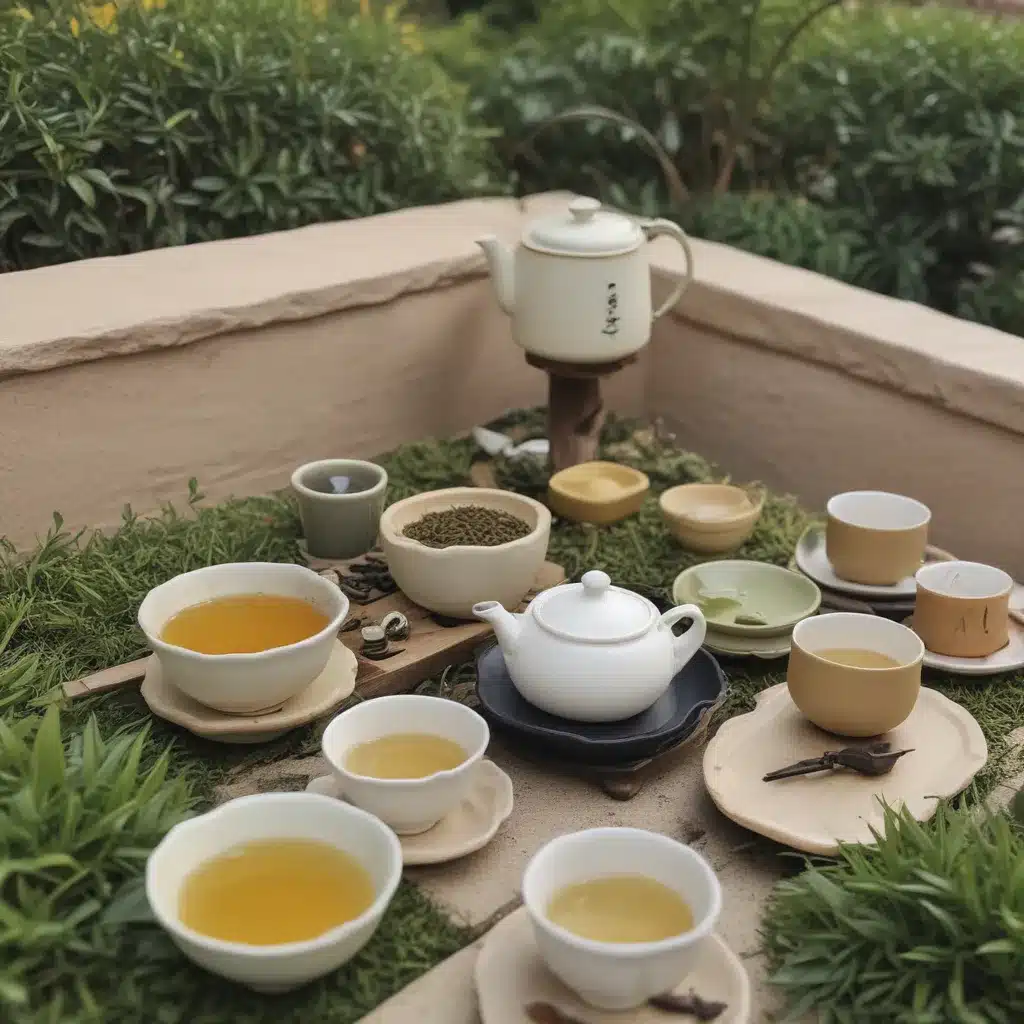
Brewing the Perfect Cup of Korean Tea
As I step into the cozy confines of Korean Garden, the aroma of freshly brewed tea wafts through the air, instantly transporting me to the serene tea houses of Seoul. This charming cafe, nestled in the heart of Boston, has become a sanctuary for those seeking to immerse themselves in the rich traditions of Korean tea culture.
To begin my journey, I sit down at one of the beautifully crafted wooden tables and am greeted by a knowledgeable barista who guides me through the extensive tea menu. Her passion for the subject is palpable, and I can’t help but feel a sense of excitement as she explains the intricate process of selecting the finest leaves, harvesting them at the peak of perfection, and meticulously preparing each cup.
As she carefully pours the steaming liquid into a delicate ceramic cup, I am struck by the sheer artistry of the ritual. The gentle swirling of the vibrant green tea leaves, the soothing aroma that fills the air, and the tranquil ambiance all come together to create a truly transcendent experience. I take my first sip, and the flavors unfold on my tongue – a perfect balance of vegetal notes, a subtle sweetness, and a hint of earthiness that leaves me craving more.
Exploring the Diverse Flavors of Korean Tea
Korean tea is a vast and fascinating world, with a rich history that spans centuries. From the delicate and fragrant Sejak green tea to the robust and earthy Woojeon, each variety offers a unique tasting journey. I find myself intrigued by the intricate nuances that distinguish these teas, and I set out to explore the full breadth of Korean tea culture.
One of the standout offerings at Korean Garden is their Balhyocha, a type of traditional black tea that undergoes a unique fermentation process. As I sip on this complex elixir, I am struck by its deep, almost velvety mouthfeel and the lingering notes of caramel and dried fruit. The barista explains that the careful curation of the tea leaves, coupled with the painstaking fermentation technique, is what gives this tea its distinctive character.
Another tea that captivates my senses is the Maesil-cha, a refreshing and slightly tart green tea infused with the essence of the Korean green plum. As I take a sip, the bright and tangy flavors explode on my palate, leaving me craving another pour. The barista tells me that this tea is particularly popular during the hot summer months, as its refreshing qualities make it the perfect thirst-quencher.
The Art of Korean Tea Ceremonies
As I delve deeper into the world of Korean tea, I become increasingly fascinated by the intricate rituals and traditions that surround it. The Korean tea ceremony, known as Darye, is a magnificent display of grace, precision, and reverence for the art of tea making.
At Korean Garden, I have the opportunity to experience this time-honored tradition firsthand. As I sit cross-legged on the floor, the barista begins the ceremony with a series of graceful movements, each one choreographed to perfection. She carefully selects the finest tea leaves, gently places them in a beautifully crafted teapot, and then meticulously pours the hot water, ensuring that the temperature is precisely right.
The entire process unfolds with a mesmerizing rhythm, as the barista moves with the fluid grace of a dancer. I find myself captivated by the attention to detail, the reverence for the tea, and the sense of tranquility that permeates the entire ceremony. As the final cup is poured and handed to me, I take a sip and am transported to a realm of pure serenity – the flavors of the tea mingling with the peaceful ambiance to create a truly transcendent experience.
Connecting with Korean Culture Through Tea
As I continue to explore the world of Korean tea at Korean Garden, I am struck by the profound way in which it is interwoven with the fabric of Korean culture. Tea is not just a beverage; it is a living, breathing expression of the nation’s history, traditions, and values.
In the cozy confines of this Boston cafe, I find myself surrounded by artifacts and artwork that speak to the rich cultural heritage of Korea. The delicate ceramic teapots and cups, the intricate calligraphy adorning the walls, and the traditional music playing softly in the background – all of these elements work together to create an immersive experience that transports me across the Pacific.
But it’s not just the physical trappings that captivate me; it’s the stories that the barista shares, the insights she provides into the deeper meaning of Korean tea culture. She tells me about the ancient tea ceremonies that were once conducted in the royal palaces, the way in which tea was used as a tool for meditation and contemplation, and the reverence with which it was treated as a sacred gift from nature.
As I listen, I find myself drawn into a world of wonder and fascination. The more I learn, the more I realize that Korean tea is not just a beverage, but a window into the very soul of the Korean people – their values, their traditions, and their deep connection to the natural world.
Discovering the Health Benefits of Korean Tea
As I continue to sip and savor the diverse range of Korean teas at Korean Garden, I can’t help but marvel at the incredible health benefits they offer. From the antioxidant-rich Sejak green tea to the immune-boosting properties of the Balhyocha, each variety seems to be a veritable elixir of wellness.
The barista, sensing my curiosity, shares a wealth of information about the various health-promoting compounds found in Korean teas. She explains how the polyphenols in green teas like Sejak can help to reduce inflammation and improve cardiovascular health, while the fermented Balhyocha is rich in probiotics that can aid in gut health and digestion.
But the real revelation comes when she introduces me to the concept of “functional teas” – blends that are intentionally crafted to address specific health concerns. One such tea, the Wulong-cha, is said to have potent fat-burning properties, thanks to its high concentration of catechins and other metabolism-boosting compounds.
As I listen, I can’t help but feel a sense of awe at the way in which these ancient tea traditions are being leveraged to promote modern-day wellness. It’s a testament to the enduring wisdom of Korean culture, and it makes me all the more eager to delve deeper into the world of Korean tea.
Connecting with the Korean Community Through Tea
As I continue to immerse myself in the world of Korean tea at Korean Garden, I can’t help but notice the way in which this charming cafe has become a hub for the local Korean community. It’s not just a place to enjoy a perfectly brewed cup of tea; it’s a gathering space, a place where people come to connect, to share stories, and to celebrate their cultural heritage.
The barista, sensing my curiosity, invites me to one of the regular tea tasting events hosted at the cafe. As I mingle with the crowd, I am struck by the sense of camaraderie and shared appreciation for the art of Korean tea. People from all walks of life – students, professionals, families – come together to exchange insights, swap recipes, and engage in lively discussions about the nuances of each tea.
But it’s not just the tea aficionados who find solace in this space; the cafe also serves as a hub for the broader Korean community. I witness families gathering to celebrate special occasions, with the ritual of tea-making taking center stage. The barista tells me that these events are not just about the tea itself, but about the way in which it brings people together, fostering a sense of connection and belonging.
As I sip my tea and observe the dynamic interactions around me, I can’t help but feel a sense of awe and admiration. This humble cafe has become a testament to the power of culture and community, a place where the rich traditions of Korea are celebrated and shared with the world.
Conclusion: Embracing the Art of Korean Tea at Korean Garden
As I prepare to bid farewell to Korean Garden, I find myself filled with a profound sense of gratitude and appreciation for the world of Korean tea that I have discovered here. What began as a simple visit to a local cafe has evolved into a deep and meaningful exploration of a rich cultural heritage, one that has left an indelible mark on my heart and mind.
From the exquisite flavors of the teas themselves to the captivating rituals and traditions that surround them, every aspect of this experience has been a revelation. I have been transported to the serene tea houses of Seoul, immersed in the art of tea-making, and connected with a vibrant community of tea enthusiasts.
But more than that, I have gained a newfound appreciation for the way in which tea can serve as a bridge between cultures, a tool for fostering connection and understanding. Here at Korean Garden, I have witnessed firsthand the power of this ancient beverage to bring people together, to celebrate shared values, and to create a sense of belonging.
As I step out into the bustling streets of Boston, I know that I will carry the lessons and experiences of Korean tea culture with me wherever I go. Whether I’m enjoying a quiet moment of reflection with a cup of Sejak or sharing the joy of Darye with friends, the essence of Korea’s tea traditions will forever be a part of my life.
So, if you find yourself in Boston and seeking a true taste of Korean culture, I urge you to visit Korean Garden. Here, you will discover not just a cup of tea, but a world of wonder, tradition, and community – a journey that will leave an indelible mark on your heart and soul.
